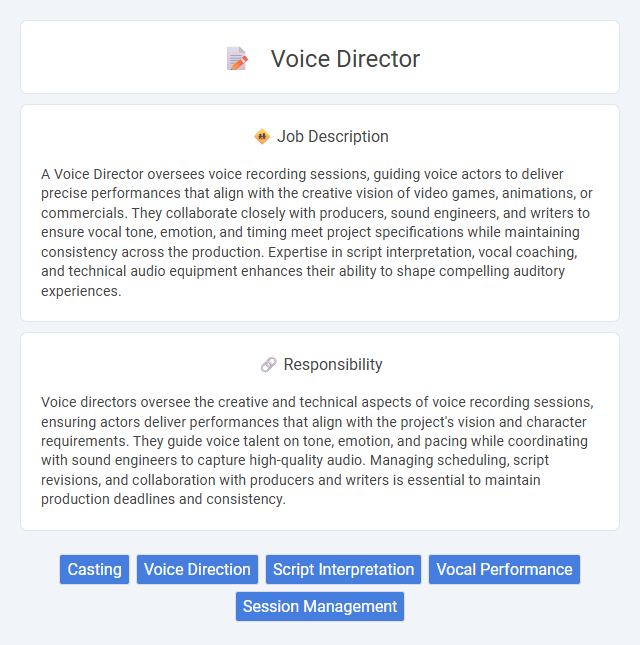
A Voice Director oversees voice recording sessions, guiding voice actors to deliver precise performances that align with the creative vision of video games, animations, or commercials. They collaborate closely with producers, sound engineers, and writers to ensure vocal tone, emotion, and timing meet project specifications while maintaining consistency across the production. Expertise in script interpretation, vocal coaching, and technical audio equipment enhances their ability to shape compelling auditory experiences.
Individuals with strong communication skills and a keen ear for detail are more likely to thrive as voice directors, as the role requires guiding voice actors to deliver precise emotions and nuanced performances. Those comfortable with high-pressure environments and possessing patience may find themselves well-suited, whereas people who struggle with giving constructive feedback or managing multiple personalities might face challenges. Candidates with a passion for audio production and storytelling probably have a higher chance of success in this creative and collaborative field.
Qualification
A Voice Director must possess extensive knowledge of vocal techniques, audio production, and script interpretation to effectively guide voice actors in delivering compelling performances. Proficiency in sound engineering software and a deep understanding of various voice styles and accents are crucial for achieving desired audio outcomes. Strong communication skills and experience in casting and talent management enhance the ability to coordinate recording sessions and provide constructive feedback.
Responsibility
Voice directors oversee the creative and technical aspects of voice recording sessions, ensuring actors deliver performances that align with the project's vision and character requirements. They guide voice talent on tone, emotion, and pacing while coordinating with sound engineers to capture high-quality audio. Managing scheduling, script revisions, and collaboration with producers and writers is essential to maintain production deadlines and consistency.
Benefit
Working as a voice director likely offers significant creative satisfaction by shaping voice performances to fit various media projects. The role probably provides opportunities for collaboration with talented actors and sound engineers, enhancing professional networks. It may also grant the chance to work in diverse industries such as animation, gaming, and advertising, contributing to career versatility.
Challenge
The voice director role likely presents significant challenges in managing diverse vocal talents and ensuring consistent performance quality across projects. Balancing creative vision with technical constraints may require strong communication and adaptive problem-solving skills. Effective voice directors probably excel in directing actors to achieve intended emotional impact while maintaining production schedules.
Career Advancement
Voice director roles offer significant career advancement opportunities through mastering voice-over casting, script interpretation, and vocal performance coaching. Progression often leads to leadership positions in creative production teams or roles as audio producers and talent managers within the entertainment and advertising industries. Developing expertise in emerging technologies such as AI voice synthesis and remote recording can further enhance professional growth and marketability.
Key Terms
Casting
Voice directors specialize in casting talented voice actors who bring characters to life across animation, video games, and commercials. They evaluate vocal range, emotional expression, and adaptability to ensure the perfect match for each role, enhancing the project's authenticity and appeal. Effective voice casting directly impacts audience engagement and overall production quality.
Voice Direction
Voice direction involves guiding voice actors to deliver performances that align with the creative vision of a project, whether in animation, video games, or commercials. This role requires strong communication skills and an in-depth understanding of vocal techniques, character development, and emotional nuance to ensure authentic and compelling voiceovers. Voice directors collaborate closely with producers, sound engineers, and writers to shape the final audio experience and enhance storytelling impact.
Script Interpretation
A Voice Director excels in script interpretation by analyzing the text to uncover emotional nuances and character motivations, ensuring authentic and compelling vocal performances. They collaborate closely with voice actors, guiding tone, pace, and inflection to match the script's intent and narrative style. Mastery of script interpretation directly enhances the production's overall storytelling quality and audience engagement.
Vocal Performance
A Voice Director specializes in guiding vocal talent to achieve optimal performance quality, ensuring clarity, emotion, and character consistency in recordings. They work closely with voice actors to fine-tune pitch, tone, pacing, and diction, enhancing the authenticity and impact of the vocal delivery. Expertise in vocal technique and understanding of audio production processes are essential for delivering nuanced, compelling voice performances across various media.
Session Management
Voice directors manage recording sessions to ensure optimal sound quality and performance accuracy, coordinating between voice actors, sound engineers, and production teams. They oversee script interpretation, timing, and emotional delivery while monitoring technical aspects like microphone placement and audio levels. Effective session management by voice directors results in seamless recording processes and high-quality voice-over productions.
 kuljobs.com
kuljobs.com